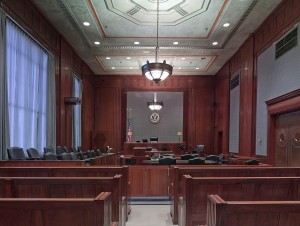By Kayleigh Butterfield
On October 30, 2015, the Fourth Circuit issued its published opinion in the criminal case United States v. Andrews. In Andrews, the Fourth Circuit affirmed the district court’s imposition of a U.S.S.G. § 3C1.1 enhancement for obstructing the administration of justice, because the district court’s finding was not clearly erroneous based on the facts of the case.
False Alibi Testimony at Robbery Trial
On March 27, 2011, Andrews robbed a Domino’s Pizza store at gunpoint. Andrews stole the manager’s wallet, along with money from the cash register and other employees. After the incident, the manager reported the robbery to the police. In the following search for Andrews, police officers found a car that had been run off the road. The car contained the manager’s wallet along with numerous articles belonging to Andrews, identifying him as the owner of the vehicle, and placing him at the scene of the crime.
Andrews was subsequently charged and pled not guilty, invoking his right to a jury trial. Prior to trial, Andrews filed a notice of alibi and a brief describing alibi testimony. In his opening statement, Andrews’ attorney previewed the alibi testimony of Andrews’ girlfriend and her mother. Both women testified that Andrews was at their home on the night of the robbery. However, the mother of one of Andrew’s children testified that Andrews’ had visited her on the night in question and had then confessed to robbing the Domino’s store. Andrews chose not to testify and was found guilty on all counts.
On remand for resentencing, the government requested a two-level enhancement for obstruction of justice under U.S.S.G. § 3C1.1. The district court found sufficient evidence to support the enhancement given Andrews’ knowledge of the false testimony and his subsequent silence during trial.
Scope of U.S.S.G. § 3C1.1
The relevant language of § 3C1.1 provides that an enhancement for obstruction applies to defendants who “willfully obstructed or impeded, or attempted to obstruct or impede, the administration of justice with respect to the investigation, prosecution, or sentencing of the instant offense of conviction . . . .” The commentary on § 3C1.1 goes on to provide a non-exhaustive list of examples of covered conduct, which includes subornation of perjury. Further, the commentary notes that the defendant is accountable for his or her own conduct as well as for “conduct the defendant aided or abetted, counseled, commanded, induced, procured, or willfully caused.”
Willful Obstruction of Justice
The Fourth Circuit first explained that, while perjury is a common form of obstruction, § 3C1.1 does not require a finding based on such narrow grounds. Nor was the district court’s finding based on perjury. The Fourth Circuit noted that the district court based its decision on facts that indicated a broader finding of a “willful obstruction of justice.”
Next, the Fourth Circuit addressed the facts and found no clear error in the district court’s imposition of the enhancement. The Fourth Circuit reasoned that the extensive evidence found in his car, as well as the testimony against him, showed that Andrews’ alibi testimony was “patently false.” As to whether Andrews knew his witnesses were going to present false testimony, the Fourth Circuit noted that Andrews’ notice of alibi, trial brief, and counsel’s opening statement all referenced the substance of the testimony. Andrews also filed a pro se motion against the prosecution for intimidating his witnesses and blocking them from testifying, and therefore should have known what testimony his motion sought to protect. Finally, the Fourth Circuit reasoned that even if Andrews remained unaware of the testimony up until his first alibi witness took the stand, he would have realized that the witness immediately following was about to present similarly false information. Thus, the Fourth Circuit found that the district court was within its discretion to impose the obstruction enhancement.
Finally the Fourth Circuit addressed Andrews’ argument that his right to remain silent was violated by the imposition of the obstruction enhancement. The Fourth Circuit made clear that the obstruction enhancement in no way overrides a defendant’s right to remain silent or present a vigorous defense. Rather, it prohibits a defendant from knowingly allowing false testimony, just as it would prevent him or her from testifying falsely.
Affirmed
For the aforementioned reasons, the Fourth Circuit affirmed the district court’s imposition of the obstruction enhancement under U.S.S.G. § 3C1.1.

